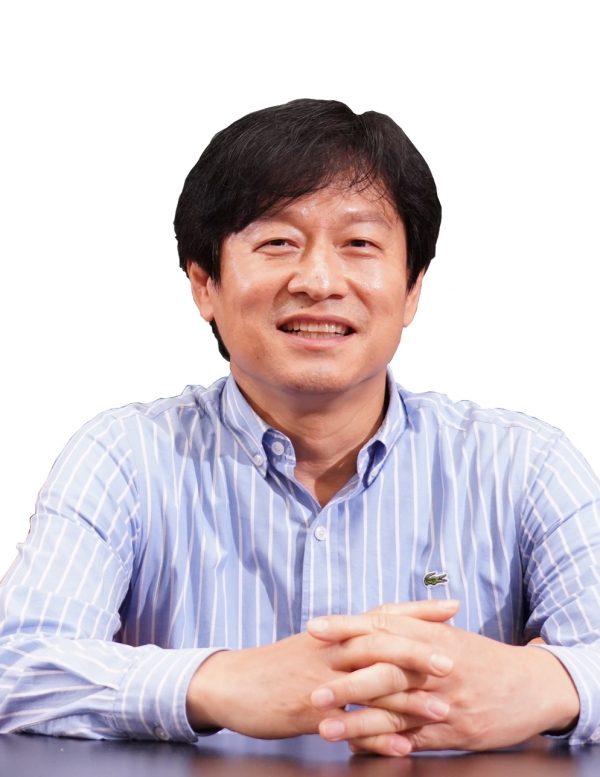Introduction
Hello, I am Professor Young-Joo Suh, currently dean of Graduate School of Artificial Intelligence (GSAI), head of Department of Computer Science and Engineering, and director of POSTECH Institute of Artificial Intelligence (PIAI).
Research at the GSAI and PIAI
The Graduate School of Artificial Intelligence and the Institute of Artificial Intelligence are not only similar in name but are also twin institutions in charge of AI education and research.
Talented graduate students have been matriculated at the Graduate School of Artificial Intelligence since it opened in Nov. 2019. Through creative and autonomous research and strong global capabilities, the graduate school aims to foster talented individuals who represent Korea. There are three key research topics at the graduate school: Media AI, Data AI, and AI Theory. “Media AI” applies AI to media-related fields such as object recognition, machine translation, and augmented reality. “Data AI” research uses modelling, reinforcement learning, and high-speed data analysis techniques to increase learning speed and improve AI performance. “AI Theory” research aims to understand the fundamentals of AI problems by modelling and analyzing machine learning techniques, thus theoretically verifying and optimizing AI algorithms. In addition, “AI+X” converges AI with other fields, such as pharmaceuticals, sports healthcare, and moral philosophy.
The AI Research Institute was established in 1991 as the POSTECH Information Research Laboratories, then was reorganized into a larger institution in 2020. It consists of full-time researchers and professors in various fields such as AI, big data, and the Internet of Things (IoT). We conduct research on core and convergent areas of AI; carrying out government and corporate assignments; as well as training AI corporate specialists.
The biggest challenge in AI
Though there are countless problems to be solved in the field of AI, the general challenge is securing quality data. AI shows excellent performance when they learn through a large, good-quality dataset. However, it is difficult to collect such data due to security and privacy implications. Thus, the government is also working hard to secure data through projects such as the “Data Dam” project.
Challenges at POSTECH’s AI Institutes
It is difficult to invite world-class accomplished professors because of the intense competition around the world. Though we should promise a competitive salary and research environment, this is very difficult in South Korea compared to other developed countries. Even though it is hard to meet the high salary level, we are still trying to provide a good research environment. Fortunately, POSTECH is succeeding in recruiting several world-class professors every year.
Another issue is POSTECH’s regional disadvantage. Most of the best students tend to prefer universities in Seoul rather than in Pohang. Of course, many excellent students join POSTECH every year; nonetheless, we are still trying to come up with a variety of measures such as providing scholarships to attract excellent students.
Advantages of the GSAI
The biggest advantage is our world-class faculty members. Currently, there are 18 faculty members at the GSAI and this will increase to 20 by the end of this year. In addition, there are 61 adjunct faculties from 13 departments at POSTECH, so in total nearly 80 professors are conducting AI research.
Differentiated student support is another advantage. Scholarships, dormitories and research funds are provided to all students, as well as opportunities to attend overseas conferences. We also support outstanding students to participate in the AI global corporation tour.
GSAI serves as the center of AI research that converges with other departments at POSTECH. Many other students apply for courses in the AI graduate school, and many professors also have high expectations of conducting convergence research that applies AI to existing academic fields. Outside POSTECH, many institutions such as large hospitals and financial institutions, including large companies such as Samsung and POSCO are working together with the graduate school.
Furthermore, the equipment infrastructure for research and study is superior to any other university in Korea. Over the past year, POSTECH has actively built a new cluster center for AI servers including the DGX-A100, the highest-spec GPU server. Open to all the AI researchers at POSTECH, we expect these servers to play an important role in producing excellent research results.
Advice for students who want to study AI at graduate school or research AI.
AI is an academic field in which machines learn to judge like humans. It is clear that there will be AI robots that supersede human intelligence in the near future. However, no matter how advanced AI systems get, it will be difficult for them to emulate genuine love and empathy. In the future, being knowledgeable will not be a source of pride. I think that a person who has the highest level of research ability as well as a warm heart and a wide emotional range is a true leader.
AI graduate school values research potential and basic knowledge the most. Because AI is an academic field that can be combined with various applied fields, the basic potential to analyze and solve problems systematically is highly important. So graduate school entrance exams test students’ basic knowledge of algorithms to see how they approach problems. In addition, learning AI requires solid mathematical knowledge in areas such as linear algebra, probability, statistics, and calculus. I think the most important thing for scholars is to hone their fundamentals. Similar to a workout, a soccer player with basic skills can be an all-around player who can easily play any position—it is the same with academics. I recommend that undergraduate students who are preparing for the AI graduate school to develop good math and programming skills, which are the fundamentals of AI.

Dean of Graduate School of Artificial Intelligence (GSAI)


